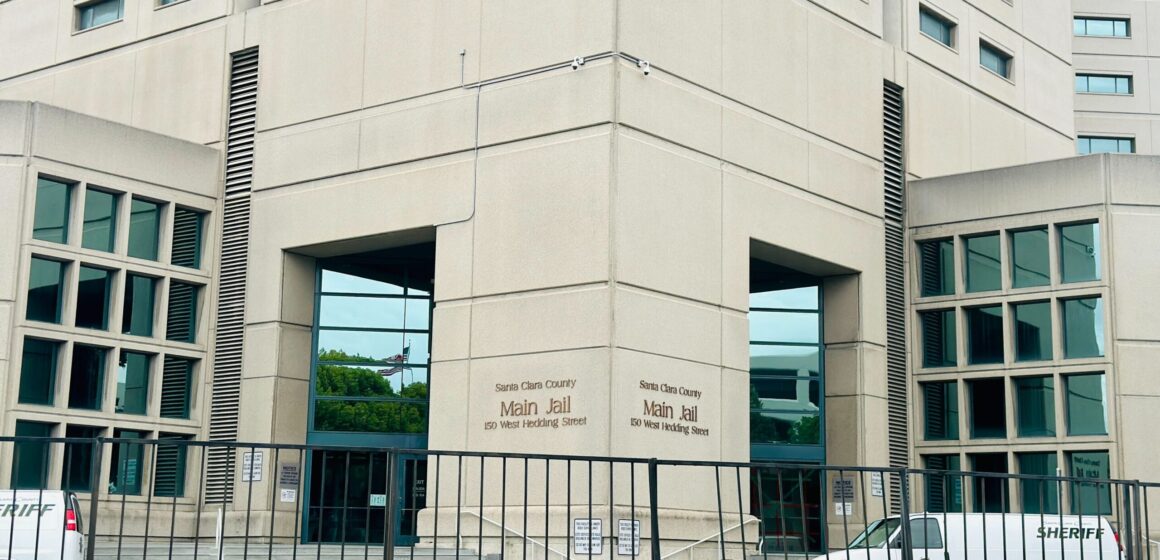Dueling forces could swing Santa Clara County’s jail population back and forth, as officials look to revive zero cash bail and move those numbers down.
County leaders recently mulled over the idea at a public safety hearing late last month. It’s unclear when or how they will push the debate forward — largely because it’s the job of Santa Clara County Superior Court judges to vote on bail dollar amounts by offenses annually under state law. That outcome could affect the fate and capacity of a new jail facility, which the Board of Supervisors can control.
Board President Otto Lee urged moving forward on the idea, while Supervisor Susan Ellenberg declined to issue specific direction in favor of continuing discussion over the next few months.
“The pandemic gave us a good snapshot for a few years of how this policy has worked. I think this concept is long overdue,” Lee said at the June 25 meeting.
Jason Galaviz, a bail bondsman who does business in five Bay Area counties, said he’s of two minds on the debate.
“For me: if it closes down, it closes down. What can you do? Obviously I’ve been doing this for a long time, providing for myself and my family,” Galaviz told San José Spotlight. “Zero bail would definitely hurt me. But think about it — you get arrested, you have to spend five days in jail, you could lose your job or home in that amount of time. A lot of people have families and pets at home.”
The zero bail decision could also counteract a new “tough on crime” measure championed by San Jose Mayor Matt Mahan. Voters approved Proposition 36, last November, reclassifying the possession of certain illegal drugs and thefts under $950 as felonies instead of misdemeanors. In some cases, people arrested for drug crimes will be required to complete treatment.
Public defenders — who witnessed the county’s short-lived zero bail experiment during the COVID-19 pandemic — acknowledge a major branding problem around the reform concept. It doesn’t mean everyone will get a pre-trial release.
There appears to be agreement that if revived, the zero bail policy would mirror the pandemic version and primarily apply to low-level felonies like drug possession and petty theft — the population impacted by Prop. 36. Violent crime defendants would stay in jail.
Some local officials warned Prop. 36 would pack the system with new low-level offense bookings. But Sheriff Bob Jonsen said he hasn’t yet seen that materialize.
“At this point, we have not seen a dramatic increase in the jail population due to Proposition 36 alone. Individuals currently in custody with a Proposition 36-related charge often remain in our care past arraignment because of additional felony charges,” Jonsen told San José Spotlight. “We are monitoring the impact of the measure closely, but so far, Proposition 36 charges by themselves have not significantly affected our overall population.”
The county jail population has declined since the pandemic, from 3,328 people in January 2020 to 2,749 last month. When the county’s judges allowed the pandemic zero bail policy to end in 2022, the jail population rose by approximately 10%, from 2,721 people in July of that year to 3,031 by October 2023.
Support for the idea has played out predictably on both sides of the courtroom. The Santa Clara County Public Defender’s Office favors restoring zero bail, while the county’s top prosecutor is against it.
Opponents said the county already has robust systems in place to keep poor people from languishing in jail before their trials. The Santa Clara County District Attorney’s Office said this sets the county apart from most of California’s 57 other counties.
District Attorney Jeff Rosen’s office argues zero bail takes informed decision-making out of a judge’s hands in cases where it’s needed, adding that the county’s Pre-Trial Services Department and judges regularly make decisions about releasing or detaining people who have been arrested.
“That’s what we should want — an informed judge making a good and timely decision on whether to release someone on their own recognizance, with conditions like electronic monitoring, or to hold them in custody, based on the individual and the circumstances of the case,” a spokesperson for Rosen’s office told San José Spotlight.
Acting Public Defender Damon Silver’s office directly oversees these pre-trial services. His office’s pre-arraignment representation unit has won national recognition for reducing poor defendants’ pre-trial jail time by more than 20 days. Yet he insists zero bail is still needed. On top of boosting cost savings and the ability to deploy jail staff more flexibly, he said it ensures pre-trial liberty doesn’t depend solely on wealth.
“It would not release people charged with dangerous or violent crimes, but avoids jailing people on minor offenses simply because they are poor,” Silver told San José Spotlight.
 Joining the calls for support is the Civil Rights Corps, a legal defense organization that won a 2021 Supreme Court ruling which found California unconstitutionally detained an elderly Black man by setting a bail amount without considering his ability to pay or considering alternatives.
Joining the calls for support is the Civil Rights Corps, a legal defense organization that won a 2021 Supreme Court ruling which found California unconstitutionally detained an elderly Black man by setting a bail amount without considering his ability to pay or considering alternatives.
Salil Dudani, an attorney for the organization, said empirical evidence has widely shown cash bail increases crime rates. On top of housing and jobs, he said these release barriers cause people to lose family and social relationships, which can affect their ability to stay out of trouble.
“Then there’s the likelihood of a post-conviction sentence. If you’re in jail pre-trial, it’s more likely you will be convicted and receive a harsher sentence,” Dudani said at the meeting.
Contact Brandon Pho at [email protected] or @brandonphooo on X.



Leave a Reply
You must be logged in to post a comment.